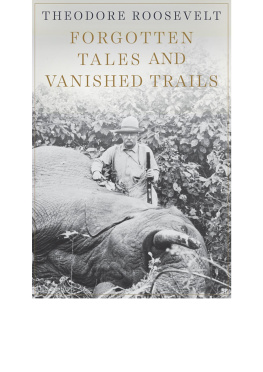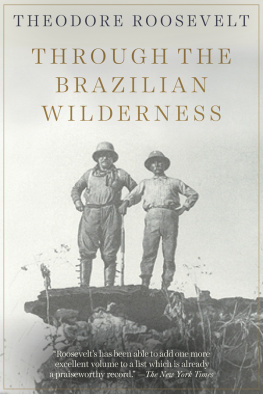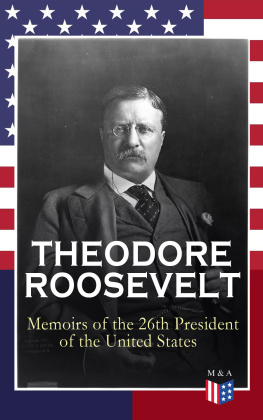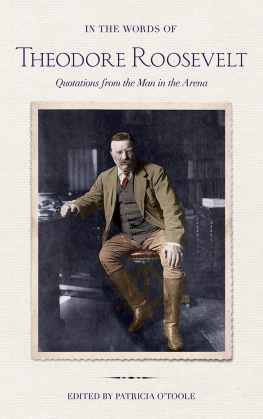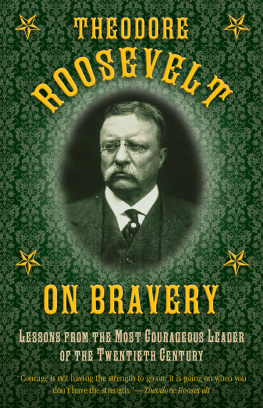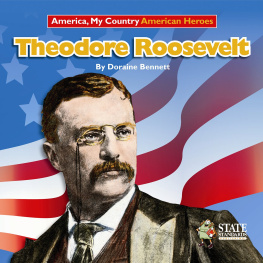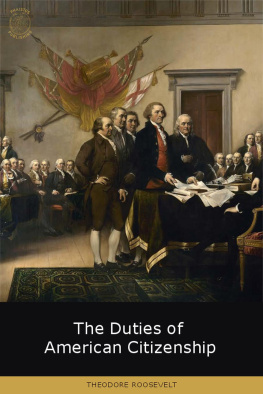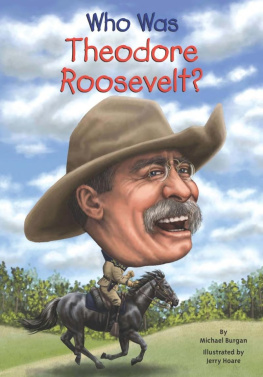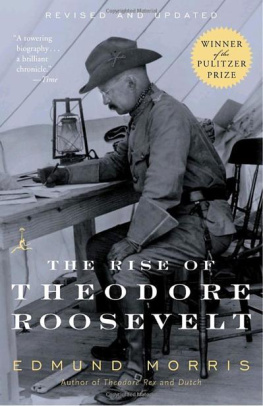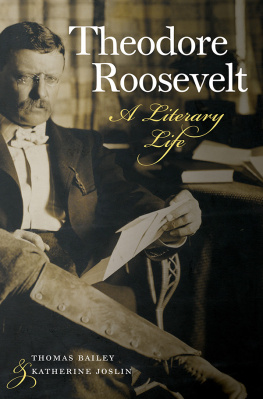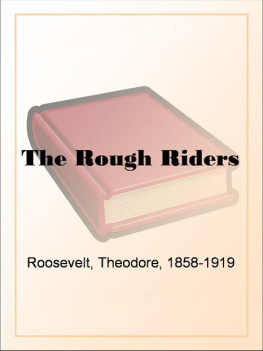Theodore Roosevelt - The Man in the Arena: Selected Writings of Theodore Roosevelt: A Reader
Here you can read online Theodore Roosevelt - The Man in the Arena: Selected Writings of Theodore Roosevelt: A Reader full text of the book (entire story) in english for free. Download pdf and epub, get meaning, cover and reviews about this ebook. year: 2016, publisher: Tom Doherty, genre: Art. Description of the work, (preface) as well as reviews are available. Best literature library LitArk.com created for fans of good reading and offers a wide selection of genres:
Romance novel
Science fiction
Adventure
Detective
Science
History
Home and family
Prose
Art
Politics
Computer
Non-fiction
Religion
Business
Children
Humor
Choose a favorite category and find really read worthwhile books. Enjoy immersion in the world of imagination, feel the emotions of the characters or learn something new for yourself, make an fascinating discovery.

- Book:The Man in the Arena: Selected Writings of Theodore Roosevelt: A Reader
- Author:
- Publisher:Tom Doherty
- Genre:
- Year:2016
- Rating:4 / 5
- Favourites:Add to favourites
- Your mark:
- 80
- 1
- 2
- 3
- 4
- 5
The Man in the Arena: Selected Writings of Theodore Roosevelt: A Reader: summary, description and annotation
We offer to read an annotation, description, summary or preface (depends on what the author of the book "The Man in the Arena: Selected Writings of Theodore Roosevelt: A Reader" wrote himself). If you haven't found the necessary information about the book — write in the comments, we will try to find it.
The Man in the Arena: Selected Writings of Theodore Roosevelt: A Reader — read online for free the complete book (whole text) full work
Below is the text of the book, divided by pages. System saving the place of the last page read, allows you to conveniently read the book "The Man in the Arena: Selected Writings of Theodore Roosevelt: A Reader" online for free, without having to search again every time where you left off. Put a bookmark, and you can go to the page where you finished reading at any time.
Font size:
Interval:
Bookmark:
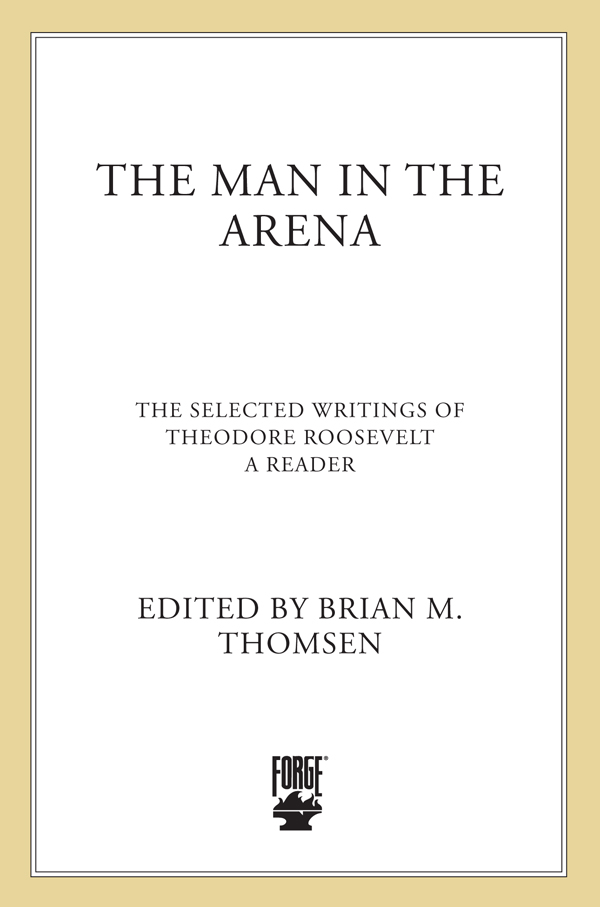

The author and publisher have provided this e-book to you without Digital Rights Management software (DRM) applied so that you can enjoy reading it on your personal devices. This e-book is for your personal use only. You may not print or post this e-book, or make this e-book publicly available in any way. You may not copy, reproduce, or upload this e-book, other than to read it on one of your personal devices.
Copyright infringement is against the law. If you believe the copy of this e-book you are reading infringes on the authors copyright, please notify the publisher at: us.macmillanusa.com/piracy.
It is not the critic who counts, not the man who points out where the strong stumbled, or how the doer could have done better. The credit belongs to the man who is in the arena, his face marred by dust and sweat and blood, who strives valiantly, who errs and falls short again and again: There is no effort without error.
But he who tries, who knows the great enthusiasms, the great devotions, who spends himself in a worthy cause, at best knows the triumph of achievement, and at the worst, fails while daring. His place shall never be with those cold and timid souls who know neither victory nor defeat.
Theodore Roosevelt
On September 11, 2001, I lost a friend by the name of John Moran. He was a Battalion Commander in the NYFD who gave his life with too many of his fire-fighting brothers in the aftermath of the terrorist attack on the World Trade Center.
John and I went through kindergarten and grammar school together (as well as four more years, despite high schools separating us, thanks to our involvement in Saint Camillus Marching Band). Usually we were side by side since our place in line was determined by size order and both John and I were individuals of height.
As life would have it our paths diverged for a while, but managed to cross again at a band reunion in the early part of 2001 where we shared reminiscences and exchanged recommendations on our current reading materials. In the years that had passed John had earned a law degree, been promoted to Battalion Commander in the NYFD, had gotten happily married, and was well on his way to making a substantial contribution to the world around him.
But then 9/11 came along.
At his memorial service I learned that John always carried in his wallet TRs quote the Man in the Arena for inspiration.
This book was inspired by him, and is dedicated to him, just the sort of book that we used to recommend to each other.
For John Moran, a man worthy of TRs epigraph.
Grateful acknowledgment is made to Tom Doherty, Jim Minz, Paul Thomsen, and Frank Weimann and the Literary Agency East for their assistance in the assembling of this volume.
In recent years it has become fashionable among Republicans to think of ones self as a successor to the mantle of Theodore Roosevelt, the youngest, most independent, and most prolific of American presidents but when it comes right down to it all candidates pale in comparison.
TR was a defense-minded conservative who preached and wielded the philosophy of the big stick to both foreign interlopers and domestic robber barons alike.
No one was going to exploit America while he was on watch, not even her own fiscal elite.
Look up rugged individual in the dictionary, and the grinning visage of Teddy is sure to jump out at you, and all contemporary mantle grabbers fade away.
and if being the first president of the twentieth century wasnt enough, he was also a gifted historian, a wild and wooly adventurer, and a man of letters.
He was man enough to fill many an arena and I pitied the gladiators and lions that were forced to face him.
As we mark the centennial of his presidency, accolades and praise resound from all corners in universal agreement. Historians (Roosevelt was the most literary of presidents he was also the most active of American writers), all go out of their way to honor him as a leader, an explorer, and a writer of few equals. Perhaps H. G. Wells summed it all up best when he referred to TR as the very symbol of the creative will in man.
* * *
This collection of his writings provides a cross section from a variety of his works to act as a sampler/reader of his prodigious publishing output.
Whether relating an anecdote from San Juan Hill or discussing the affinities of the works of Dante and Walt Whitman, one thing is unmistakablehe was a bully of a writer.
He was the man in the arena, and not a single critic could lay a glove on him.
(Editors note: The quotations that introduce each section are taken from TRs autobiography.)
A NARRATIVE OF FACTS IS OFTEN MORE CONVINCING THAN A HOMILY .
The following excerpts from his signature works of history clearly place him in the ranks with Francis Parkman and Winston Churchill as master narrative historians. The fact that he was only twenty-four years of age when The Naval War of 1812 was published is even more awe-inspiring.
Spread of the Modern English Race
During the past three centuries the spread of the English-speaking peoples over the worlds waste spaces has been not only the most striking feature in the worlds history, but also the event of all others most far-reaching in its effects and its importance.
The tongue which Bacon feared to use in his writings, lest they should remain forever unknown to all but the inhabitants of a relatively unimportant insular kingdom, is now the speech of two continents. The Common Law which Coke jealously upheld in the southern half of a single European island, is now the law of the land throughout the vast regions of Australasia, and of America north of the Rio Grande. The names of the plays that Shakespeare wrote are household words in the mouths of mighty nations, whose wide domains were to him more unreal than the realm of Prester John. Over half the descendants of their fellow countrymen of that day now dwell in lands which, when these three Englishmen were born, held not a single white inhabitant; the race which, when they were in their prime, was hemmed in between the North and the Irish seas, to-day holds sway over worlds, whose endless coasts are washed by the waves of the three great oceans.
There have been many other races that at one time or another had their great periods of race expansionas distinguished from mere conquest,but there has never been another whose expansion has been either so broad or so rapid.
At one time, many centuries ago, it seemed as if the Germanic peoples, like their Celtic foes and neighbors, would be absorbed into the all-conquering Roman power, and, merging their identity in that of the victors, would accept their law, their speech, and their habits of thought. But this danger vanished forever on the day of the slaughter by the Teuto-burger Wald, when the legions of Varus were broken by the rush of Hermanns wild warriors.
First Overflow of the Germanic Peoples
Two or three hundred years later the Germans, no longer on the defensive, themselves went forth from their marshy forests conquering and to conquer. For century after century they swarmed out of the dark woodland east of the Rhine, and north of the Danube; and as their force spent itself, the movement was taken up by their brethren who dwelt along the coasts of the Baltic and the North Atlantic. From the Volga to the Pillars of Hercules, from Sicily to Britain, every land in turn bowed to the warlike prowess of the stalwart sons of Odin. Rome and Novgorod, the imperial city of Italy as well as the squalid capital of Muscovy, acknowledged the sway of kings of Tentonic or Scandinavian blood.
Font size:
Interval:
Bookmark:
Similar books «The Man in the Arena: Selected Writings of Theodore Roosevelt: A Reader»
Look at similar books to The Man in the Arena: Selected Writings of Theodore Roosevelt: A Reader. We have selected literature similar in name and meaning in the hope of providing readers with more options to find new, interesting, not yet read works.
Discussion, reviews of the book The Man in the Arena: Selected Writings of Theodore Roosevelt: A Reader and just readers' own opinions. Leave your comments, write what you think about the work, its meaning or the main characters. Specify what exactly you liked and what you didn't like, and why you think so.


